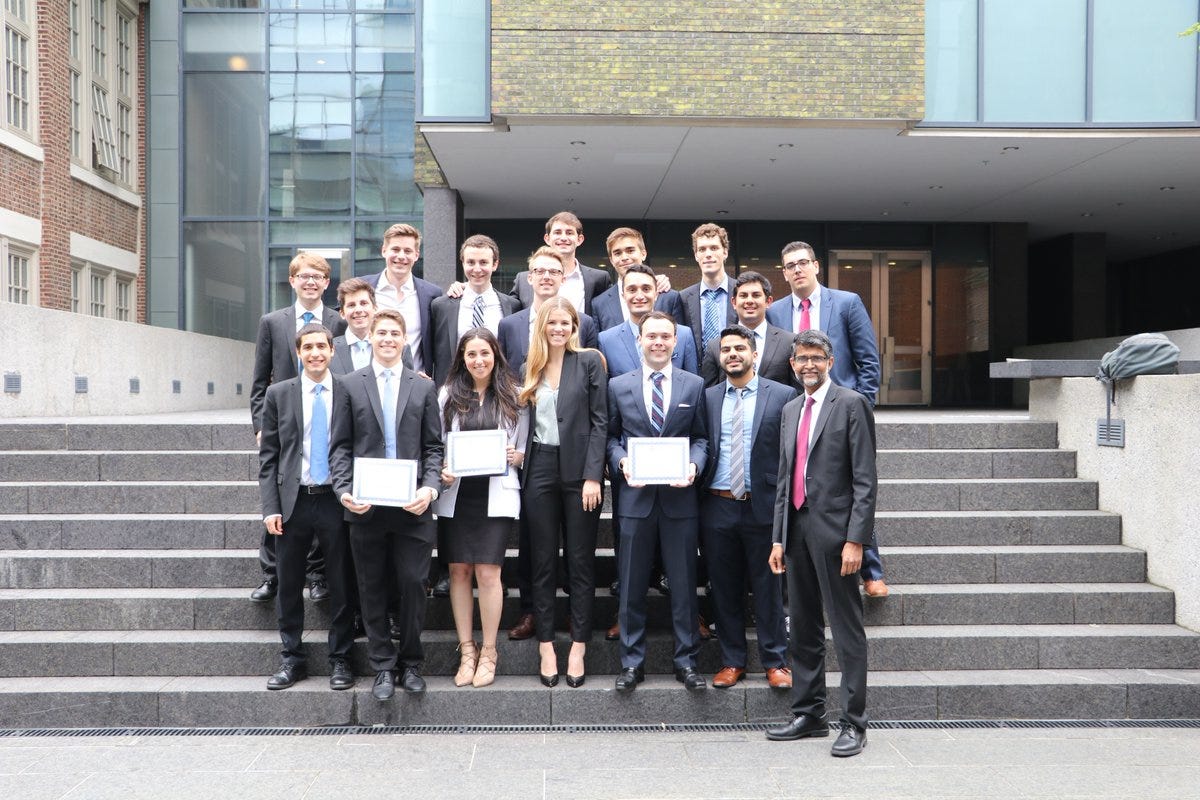Project LifeWatch, a Wearable Epinephrine Injector, Wins 2018 Senior Design Competition

Each spring, Penn Engineering’s Senior Design Project Competition pits teams from the school’s six departments against one another. Tasked with finding a real-world problem and solving it with a new piece of technology, the teams spend several months brainstorming different approaches, refining techniques, and consulting with a faculty advisor and outside experts who have experience in the field of their application.
Projects originate in two required courses taken in the fall and the spring semesters of the senior year. Students form teams and work with faculty advisors to come up with devices, apps, and diagnostics that are then presented at departmental and, if they advance, the school-wide finals.
On April 27, contenders assembled in the Wu and Chen Auditorium in Levine Hall and made their pitches to a panel of alumni judges, who graded them on their design process, the results they achieved, and how well they presented the impact of their technology.

1st Place
Project LifeWatch (MEAM)
Daniel Orol, Spencer Fox, Ben Bernstein, Jake Snipes, Reed, Ginsberg, and Alex Garcia
Advised by Prof. Kevin Turner
LifeWatch is a wearable epinephrine auto-injector for people with anaphylactic allergies. Finding the right springs and syringe mechanism allowed the team to fit the device into the form-factor of a watch, which is easier to remember and carry as compared to a bulkier EpiPen.

2nd Place
Omnigami (MSE)
Simeon Ristic
Advised by Prof. David Srolovitz
Omnigami is a math-based toolkit that describes how shape-memory polymers can be used to create self-folding origami structures. By incorporating programmable mechanical properties into these polymers, 3D printers can become “4D printers,” with the extra dimension being time. Temperature cues allow those shapes to change over time, useful in applications like deploying space-based solar arrays, implantable medical devices, or low-cost robots.

3rd Place
Daedalus (MEAM)
Eugenia Bejar, Ros Shinkle, Pele Collins, Max Newberger, Michael Pearson, Rome Arnold
Advised by Prof. Kevin Turner
Daedalus is device for improving how aerospace parachutes are deployed. “Disreefing” is the process of incrementally opening a parachute; current disreefing systems open in stages to break up deceleration into a set of smaller forces. Instead of stages, Daedalus opens the parachute continuously, which ultimately reduces the maximum force the capsule experiences.
Honorable Mentions
Foot’s Ease (ESE)
Julia L Lin, Ece N Sahin, Cody Cluser, Kelly Larkin
Advised by Profs. Ari Brooks and Sid Deliwala
Foot’s Ease is a smart shoe and activity tracker that lifts the foot with a motorized cable in response to sensors on the bottom of the shoe. Intended for patients with foot drop, the device can increase mobility and provide real-time data feedback, as well as detect falls and signal for help if necessary.
MEDISIGN (BE)
Kate Panzer, Jackie Valeri, Nick Stiansen, and Karol Szymula
Advised by Prof. Michael Rizk
Medisign is a portable, automatic American Sign Language translator for medical conversations. Machine translation takes spoken English and cuts together video clips of a ASL user. To translate in the other direction, a motion capture camera tracks the ASL user’s joint position and facial expression.
SeaSearcher (MEAM)
Eric Quesada, Jay Fleischer, Xavier Perraudin, Nikhil Chari, Alex Andalia, Thomas Macchio
Advised by Prof. Mark Yim and Paulo Arraita
SeaSearcher an aquatic robot designed specifically for coastal areas and coral reefs. Designed with portability, cost, and ease of operation in mind, the robot fits into carry-on luggage and can be remote controlled or programmed to follow pre-determined waypoints.
